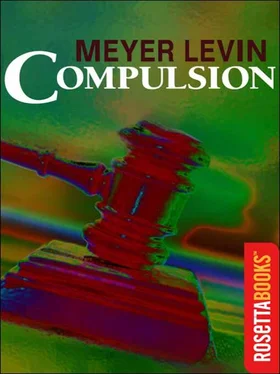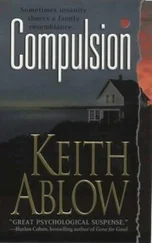“On page 108: ‘My associate said, “This is terrible, this is terrible”. It took five minutes to cool him down.’ Emotion or no emotion? ‘I told him it was all right and talked and laughed to calm him.’”
And what of Artie’s lack of emotion? In reciting the crime to the doctors, “‘When he told of returning the car to the agency at four-thirty, he choked up and wiped his nose with his fingers.’ Yes, he cried, over the failure of it all.
“No emotion in superman Straus? No emotion in superman Steiner? No, when they came into court they killed all emotion on advice of counsel! The desire to save their own worthless hides is the only thing that enters their thoughts. No emotion, and yet, on page 108, Judd tells the doctor that he is rather fond of small children, he could not have struck the blow because he always wants to take a crying child in his arms and comfort it!
“The report says, ‘While in jail the patient has clearly been under considerable emotional tension and is rather irritable at times. The newspaper report that he is a cold-blooded scientist with no emotions and entirely unconcerned is completely wrong’! They admit it themselves! All intellect and no emotion, says Jonathan Wilk, and therefore not responsible. The report says, ‘The patient ordinarily is able to make a calm, self-possessed appearance and before reporters and visitors seems perfectly self-possessed and unconcerned. On the other hand, when he does not feel the need for doing this, and when he is talking frankly with people and no longer posing, he shows a good deal of irritability and nervous tension.’”
Horn grinned at them, as though he had snatched away the mask.
If there could be any doubt that they deserved death, Horn reminded the court of Artie’s own mother’s opinion, before the murderers were known. Whoever did it, she had said, should be tarred and feathered and strung up!
“What did she mean?” Horn demanded. “She meant that a mob ought to take charge of such a beast! Yes! We have heard Mr. Wilk talk repeatedly of the hoarse cry of the angry mob. Well, there is no danger or no fear of us actually hearing the hoarse cry of the angry mob, if the extreme penalty is visited here. I am not so sure, otherwise!”
He paused, head down, like a fighter aiming for the kill. Swinging his chunky body, Horn demanded, what of the tender friendship between these two perverts? Hadn’t Artie again and again contemplated killing Judd? This fact was all over the report.
“In other words, all this king-and-slave fantasy is a pure figment of the imagination of the defence. The real tie that binds in this case is that one was a criminal, the other had something on him. Straus was afraid of exposure: he contemplated murdering Steiner. And the other blackmailed him, for perversion. Straus wanted to shut the mouth of Steiner and then break with him. For that he needed something on Steiner. That is why he wanted Steiner to help him choke the life out of little Paulie Kessler.”
Horn threw down the Storrs-Allwin report, as something demolished. “That is the medical defence in this case. Mr. Wilk has read you poetry. May I be permitted, if Your Honour please, to read you some prose?”
And he read, “‘The White House, Washington, D.C.’”
It was a letter denying an appeal from a death sentence. “‘I have scant sympathy with a plea of insanity advanced to save a man from the consequence of his crime, when, unless that crime had been committed, it would have been impossible to persuade any reasonable authority to place him in an asylum as insane.’” The signature was that of Theodore Roosevelt.
“Is not that the case here?” Horn demanded. “If this crime had not been committed, could any reasonable authority be persuaded to send either one of these men to an asylum as insane?”
Thus he ended his first day.
There remained Wilk’s plea of youthfulness. Was eighteen too young to die? Fresh in the morning, Horn began: “I submit, if Your Honour please, if we can take the flower of American manhood, take boys at eighteen years of age and send them to their death in the front-line trenches of France in defence of our laws, we have an equal right to take men nineteen years of age and take their lives for violating these laws that these boys gave up their lives to defend.
“The law that Your Honour is bound to enforce in this case declares that from fourteen years of age up a boy has the capacity to commit a crime and is entirely and thoroughly responsible for it.”
Then, like a litany, he began reading the names and ages of men who had been hanged. It seemed to go on for ever. Buff Higgins was hanged at the age of twenty-three. Henry Foster, twenty-four, Viana, seventeen…
And if but few of them had been hanged on a plea of guilty the reason was simple. Obviously, if a lawyer could not get assurance of a deal through the State’s Attorney, he would say, “Well then, I am going to take a chance on twelve men. They can’t do any worse to me, and I’m going to give my client a run for his money.”
Why hadn’t it been done this time? Because the crime was so subhuman, as the defence itself had admitted, that they simply could not go before a jury.
And Horn began his ultimate portrayal of the crime, the blows on the head, the suffocation, and working himself up to hoarse, staccato shrieks; “And then what did the fiends, the perverts, do to that dead boy in the car? Did not the coroner’s physician testify-”
To the banging gavel, Horn stopped. Quite calmly he dropped that point and said, “I think, if Your Honour please, I have now covered the three defences set forth by Mr. Wilk: the defence of mental disease, the question of motive, the defence of youthfulness. But the real defence in this case is Jonathan Wilk and his peculiar philosophy of life. When I was listening to Mr. Wilk plead for mercy for these two men who showed no mercy, it reminded me of the story of Abraham Lincoln, about a young boy of approximately their age, whose parents were wealthy, and he murdered both of them so as to inherit their money. His crime was discovered the same as this crime has been discovered, and the court asked him for any reason why the sentence of death should not be passed on him, and he promptly replied that he hoped the court would be lenient to a poor orphan.
“Mr. Wilk quoted considerable poetry to you, and I would like again to be indulged while I read a little bit of prose.”
He picked up a printed sheet. It was an address, he explained, delivered to the prisoners in the county jail by a distinguished criminologist. Horn read, “‘The reason I talk to you on the question of crime, its cause and cure, is because I really do not believe the least in crime. There is no such thing as a crime, as the word is generally understood. I do not believe that there is any sort of distinction between the moral condition in and out of jail. One is just as good as the other. The people here can no more help being here than the people outside can avoid being outside. I do not believe that people are in jail because they deserve to be.’”
The courtroom was abuzz as people told each other what Horn was quoting. He read more slowly, in an unmistakable imitation of Jonathan Wilk’s reflective, pleading manner: “‘I believe that progress is purely a question of pleasurable units that we get out of life. The pleasure-and-pain theory is the only correct theory of morality and the only way of judging life.’” Horn looked up. “Isn’t that exactly the doctrine of Judd Steiner? And that is the doctrine expounded last Sunday in the press of Chicago by Jonathan Wilk!”
This was scarcely an exact statement. The piece had been dug up by Mike Prager, from a report of a sensational talk given at the county jail by Jonathan Wilk, twenty years before.
Читать дальше












